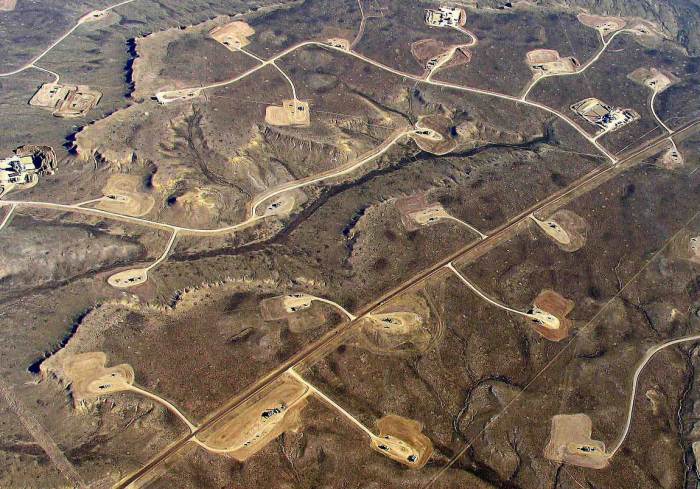
Image: Simon Fraser University via Flickr
Northern Territory Chief Minister Michael Gunner yesterday announced his government will go ahead with permitting fracking of onshore unconventional shale gas reservoirs in the NT, ending a moratorium on the activity.
Mr. Gunner said his Government had accepted all 135 recommendations in the final report from The Scientific Inquiry into Hydraulic Fracturing in order to minimise risks.
“We promised an independent, scientific inquiry after which we would either ban fracking or allow it in highly regulated circumstances in tightly prescribed areas,” stated the Chief Minister. “We have kept our promise. We have accepted the key finding of the report – that if all the recommendations are implemented the risk from fracking can be reduced to an acceptable level.”
Mr Gunner said 49% of the Territory will be “frack-free”. The remaining 51% of the Northern Territory works out to be around 688,000 square kilometres, although of course only some of that area will have resources to make it worthwhile to be fracking around in.
As we recently reported, The Australia Institute concluded that allowing fracking in the Territory could result in emissions equivalent to up to 100 times more than savings under the Northern Territory Government’s Roadmap to Renewables: 50% by 2030 policy1, in which solar power is a centrepiece technology.
Mr. Gunner says he has written to Prime Minister Malcolm Turnbull and Opposition Leader Bill Shorten seeking their agreement to partner up in offsetting all additional emissions from fracking. How such an arrangement may look wasn’t expanded on.
An open letter to The Scientific Inquiry in February signed by academics, scientists, doctors and a former senior fossil fuel executive said development of onshore shale gas and shale oil fields should not proceed – under any circumstances.
Greenpeace’s reaction to the Northern Territory Government’s decision was swift.
“The government’s decision to open the Northern Territory to the environmental devastation of fracking is short-sighted and will lead to the contamination of water, increased carbon emissions and a myriad of health problems for the people of the NT,” said Greenpeace Australia’s Nikola Casule.
The group says fracking has already been proven to be an ecological disaster all over the world, including in Australia.
“There are no upsides to this move. It will exacerbate climate change, slow the transition to clean renewable energy, destroy water and agricultural land and harm people’s health,” said Mr. Casule.
Even Chief Minister Gunner acknowledged the decision may not be popular among voters, which really makes you wonder.
“I understand that many Territorians feel passionately about fracking and were hoping for a different announcement today,” he said.
Perhaps the Chief Minister is hoping people’s memories of their disappointment and disillusionment will fade by the next election.
The Final Report from The Scientific Inquiry into Hydraulic Fracturing can be downloaded here, or the much slimmer summary here (PDF). The Government’s response to the Final Report of the Inquiry can be found here (PDF). Work is starting on a detailed implementation plan, which will be released to the public in July this year.
Footnotes
- There doesn’t appear to have been much progress on the Roadmap in recent months, and perhaps this fracking situation is one of the reasons why. ↩

 RSS - Posts
RSS - Posts



Our wealth is in the land. Money is only a tool to help to share it and we can use or misuse it for this purpose. Money itself is worthless if there’s nothing to use it for or if it replaces real wealth. If it’s treated as more important than the land, our real wealth is reduced. It’s negligent and inexcusable of the NT government to forget this.
No, Darian, our wealth is in ourselves, in our minds and brains. Money is not a tool nor is it worthless. It is a measure of access to resources (Economics 101). These resources are on the land, over the land and under the land and sea. It is stone-age superstition to see the land surface as the most important thing about our lives.
Our best intelligence says that what the NT government has decided is rational and beneficial to our society. Greenpeace appeals to the mindless and least intelligent among us and very little of its agenda has benefited mankind. “Freezing in the dark” is a very good summary of Greenpeace’s ambitions for humanity.
Now, how about an unbiassed assesment of the NT government’s decision based on the actuality of fracking around the world – including its very large benefits.
The science is settled then!
You’re quite wrong. Money has no worth in itself whatsoever. It’s only an exchange mechanism created by banks. Nor is it the only measure of access to resources – human toil is another measure. Economics 101 should have been fundamentally rewritten after the US left the gold standard, and it’s still holding us back.
Your “best intelligence” about the NT government’s decision is so selective it’s worthless.
According to your definition of wealth, the resources don’t count either, only the access to them. Your “unbiased” assessment of the NT decision omits the extensive damage that fracking has done around the world. That’s biased by any definition and certainly wouldn’t pass any Cost Benefit 101.